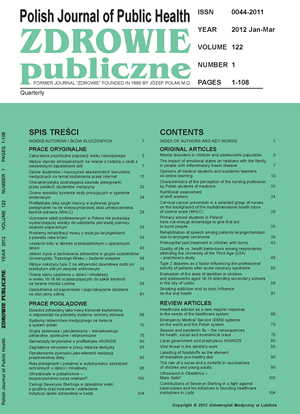Quality of life vs. health behaviours among respondents attending the University of the Third Age (U3A) – preliminary study
Keywords:
quality of life, health behaviours, the elderlyAbstract
Introduction. Through its tasks, the University of the Third Age (U3A) becomes a part of policies of a modern and highly developed society, which aims at providing the elderly with adequate conditions and opportunities so they could enjoy not only good health but also improve their quality of life through proper health behaviours.
Aim. The purpose of this preliminary study was to examine the relation between quality of life evaluation and health behaviours among U3A students.
Material and methods. Mean age in the studied group was 65.0±6.4 years. A method of diagnostic survey questionnaire was applied in order to evaluate the quality of life. The WHOQOL-BREF and Health Behaviour Inventory (HBI) were used.
Results. Overall quality of life score was 61.0±9.6 points. The highest score of quality of life was noted in physical functioning whereas environmental and social functioning received the lowest number of points (p=0.004). Health behaviours were intermediate (51%) or good (34%) among most respondents while only 14% received low scores.
The mean score of health behaviour (HBI) was 86.8±14.3 points with the following values in particular categories: 3.58 in eating habits, 3.66 in prophylactic behaviours, 3.76 in mental attitude, and 3.39 in health practices. Satisfaction with quality of personal life was declared by 51% of respondents whereas 60% of the group were satisfied with their health. No statistically significant correlation between quality of life score and health behaviours was found.
Conclusions. The preliminary character of this study may have a practical implication used for further planning of lecture subjects for students of the University of the Third Age where the improvement of quality of life is the most important purpose.
References
1. Ambroży D. Zdrowie jako wartość w przestrzeni aksjologicznej. In: Ann UMCS Sect D. Promocja zdrowia w hierarchii wartości. 2005;40:2-7.
2. Muszalik M, Kędziora-Kornatowska K. Jakość życia przewlekle chorych pacjentów w starszym wieku. Gerontol Pol. 2006;14(4):185-6, 188-9.
3. Grodzki T, Kocemba J, Skalska A. Geriatria z elementami gerontologii ogólnej. Podręcznik dla lekarzy i studentów. Gdańsk: Via Medica; 2007.
4. Panek A. Aktywność wolnoczasowa seniorów jako profilaktyka, terapia, jako styl i sens życia. Państwo i Społeczeństwo. 2007;(3):159-68.
5. Wołowicka L, Jaracz K. Polska wersja WHOQOL-100 i WHOQOL-BREF. In: Wołowicka J (ed) Jakość życia w naukach medycznych. Poznań; 2001.
6. Juczyński Z. Narzędzia pomiaru w promocji i psychologii zdrowia. Warszawa:Pracownia testów Psychologicznych Polskiego Towarzystwa Psychologicznego; 2001. p.116-24.
7. Moczko JA, Bręborowicz GH, Tadeusiewicz R. Statystyka w badaniach medycznych. Warszawa: Springer PWN; 1998.
8. Muszalik M, Kędziora-Kornatowska K. Jakość życia przewlekle chorych pacjentów w starszym wieku. Gerontol Pol. 2006;14(4):185-9.
9. Farnik-Brodzińska M, Pierzchała W. Znaczenie badań jakości życia w przewlekłych chorobach układu oddechowego w aspekcie holistycznego pojęcia medycyny. Wiad Lek.1998;(7-8):316-20.
10. Dybinska E. Społeczno-środowiskowe uwarunkowania zachowań rekreacyjnych osób w wieku poprodukcyjnym. Ann UMCS Sect D. 2007;62(2):131-7.
11. Kowalik S, Ratajska A, Szmaus A.W poszukiwaniu nowego wymiaru jakości życia związanego ze stanem zdrowia. In: Jakość życia w naukach medycznych Quality of life in medical sciences. Poznań; 2001. p. 17-9.
12. Zielińska-Więczkowska H, Kędziora-Kornatowska K. Jakość życia chorych z pierwotnym nadciśnieniem tętniczym w wieku podeszłym na tle zmiennych społeczno-demograficznych (część I). Pielęg XXI w. 2006;4(17):117-20.
13. Kozieł D, Kaczmarczyk M, Naszydłowska E, Gałuszka R. Wpływ kształcenia w Uniwersytecie Trzeciego Wieku na zachowania zdrowotne ludzi starszych. Studia Medyczne. 2008;12:23-8.
14. Franek G, Cabaj M. Zachowania zdrowotne ludzi w starszym wieku. Ann UMCS Sect D. 2007;62(suppl.18):157, 221.
15. Borzucka D, Rektor Z. Motywy podejmowania aktywności fizycznej przez ludzi starszych. In: Promocja zdrowia w hierarchii wartości. Lublin. Ann UMCS Sect D. 2005;60(suppl.16):43, 193.
16. Żołnierczuk-Kieliszek D. Zachowania zdrowotne i ich związek ze zdrowiem. Lublin: Wydawnictwo Czelej; 2002.
17. Łój G. Rehabilitacja a jakość życia osób w starszym wieku. Gerontol Pol. 2007;4(15):153.


